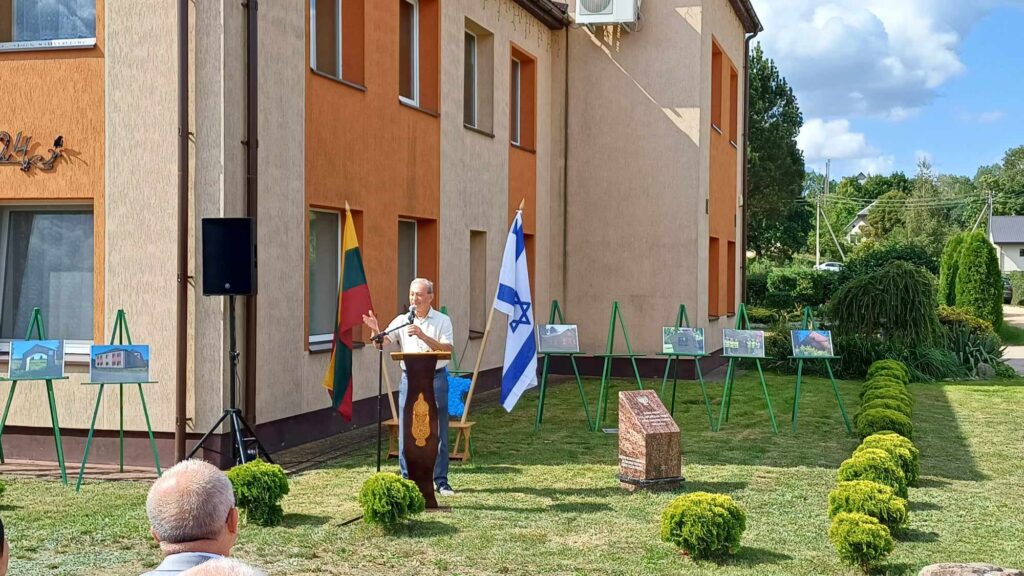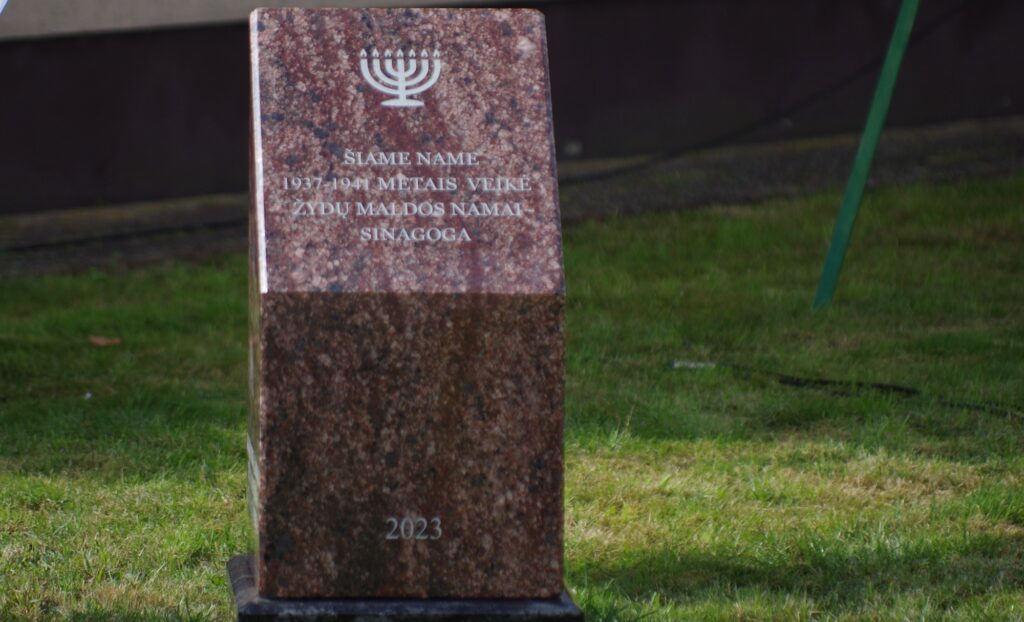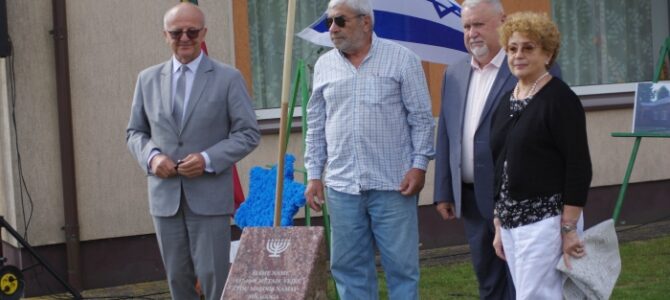A stone stele marking the site of the synagogue which once served the Jewish community in Balbirishok (Balbieriškis) was unveiled in the small Lithuanian town last week.
Attending the unveiling ceremony were Lithuanian Jewish Community chairwoman Faina Kukliansky, Kaunas Jewish Community chairman Gercas Žakas, US embassy chief of mission William Kendrick, Israeli ambassador to Lithuania Hadas Wittenberg Silverstein, educational program coordinator of the International Commission for Assessing the Crimes of the Nazi and Soviet Occupational Regimes in Lithuania Ingrida Vilkienė, representatives of the Prienai regional administration and the Balbieriškis aldermanship and a large contingent of local residents and students from the Balbieriškis primary school’s Tolerance Center.
LJC chairwoman Kukliansky welcomed the audience and said she was impressed and pleased the truly significant role played by Litvaks in the history of the town was being remembered and appreciated.


According to jewishgen.org:
Translation of the “Balbirishok” chapter from
Pinkas Hakehillot Lita
Balbieriskis (Lith.)
Balbirishok (Yiddish), Balverzhishki (Russian)
A district city in the Province of Marijampole
Located in Southwest Lithuania, on the left bank of the Neiman River, approximately 18 kilometers northwest of the railroad center of Alita (Alytus, cf.). The town developed adjacent to the large estate established there in the beginning of the 16th century. In 1520, it was awarded the privileges of a city. However, during Prussian rule (1795-1807) this status was withdrawn because of its small population. Between 1807-1815, it was included in the territory of the Grand Duchy of Warsaw. In 1815, after Napoleon’s defeat, it became Russian territory and eventually was made part of Suvalk Province. Under Russian rule, Balbirishok developed into an important commercial center. At the end of the 19th century, when the rail line was laid to Alita and Pren (Prienai), those two towns grew at the expense of Balbirishok, whose importance declined. Between 1915-1918, during World War I, the German army occupied the town. During Lithuania’s independence (1918-1940), Balbirishok was a sub-district city.
Balbirishok was one of the 246 settlements in Poland that had no restrictions on Jewish residents. It seems that Jews first settled there in the mid 17th century. At that time, they mostly lived in the surrounding villages. They were in the lumber and grain trade and some of the wealthy merchants among them routinely accompanied their merchandise to Germany on the ferries and barges that plied the Neiman.
In 1881, a pogrom was carried out against the Jews of the town. On a regular market day, on the eve of Yom Kippur, farmers raided the Jewish shops. They stole whatever they could carry, doused what was left with kerosene and set them on fire. Windows of houses were smashed, pillows and bedding ripped open and tossed about, and Jews were beaten. One person subsequently died of is injuries and more than 20 were seriously injured. The rioters broke into the synagogue and Beit Midrash [study hall] destroying anything they could. The town’s Hevra Kadisha had nine members in 1881.
Previous to World War I, the local children were educated in the heder and in the Talmud Torah. There were some enlightened young people in the town who thirsted for knowledge. Through the organization Mifitzei Haskalah [Spreaders of Knowledge] in Russia, secular books were sent to them. A letter of gratitude, published in the Hebrew newspaper Hamelitz on January 2, 1883, and signed by Reuven Horowitz in the name of the town’s young people, thanks the organization for sending six books. …
And:
Preserving Our Litvak Heritage
Balbieriskis (Balbirishok)
(Balbieriškis, Lithuania)
54°32′ 23°53′
Balbieriskis (Balbirishok in Yiddish) is situated in southwestern Lithuania, on the west bank of the Nemunas River, about 18 km. (12 miles) north west of the railway station in Alite (Alytus). The town developed alongside an estate established by a noble Russian family at the beginning of the sixteenth century. Over the years the owners changed and in 1846 it became the property of the daughters of Graf Tishkevitz. Balbirishok received the rights of a town in 1520.
Balbirishok was part of the Polish–Lithuanian Kingdom until 1795, when the third division of Poland by the three superpowers of those times, Russia, Prussia and Austria, resulted in Lithuania becoming partly Russian and partly Prussian. The area of the state which lay on the west bank of the Neman River (Nemunas) was handed over to Prussia while the other area became a part of Russia. Thus Prussia ruled from 1795–1807 and the rights of the town were annulled because of its small population.
After Napoleon defeated Prussia and according to the Tilzit agreement of July 1807, Polish territories occupied by Prussia were transferred to what became known as the Great Dukedom of Warsaw, which was established at that time. The King Friedrich–August of Saxony was appointed duke, and the Napoleonic code became the constitution of the dukedom, according to which everybody was equal before the law, except for the Jews who were not granted any civil rights.
During the years 1807–1815 Balbirishok was included in the Great Dukedom of Warsaw. In 1815, after Napoleon was defeated in Russia, all Lithuania was annexed to the Russian Empire; this included Balbirishok (Balverzhishki in Russian,) which was in the Suwalk Province (Gubernia). Under Russian rule the town grew and became an important commercial center. Its merchants developed business connections with Leipzig and other towns in Germany, the main export item to that country being timber.
At the end of the nineteenth century, with the construction of the railway to Alite and Pren (Prienai), these two towns began to grow, to the detriment of Balbirishok.
During World War I Balbirishok was occupied by the Germans, who ruled it from 1915 until 1918. During the period of independent Lithuania (1918–1940), the town was the administrative center of the county.
[Page 21]
Jewish settlement until World War I
Balbirishok was one of the 246 towns in the Polish Kingdom where there were no restrictions on Jewish settlement. Probably most Jews moved to Balbirishok and its environs during the middle of the seventeenth century. They dealt in timber and grain. Wealthy Jewish tradesmen exported goods to Germany by rafts and barges on the Nieman (Nemunas) River. …


